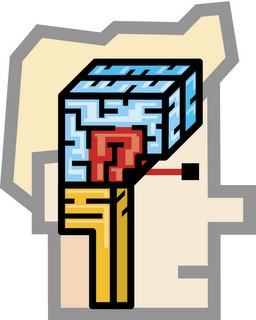
Here's a guest post from
Douglas Johnston of
DIY Planner fame:
Vive la révolution!by Douglas Johnston
--------------------
I spent last year working a full-time contract as an I.T. trainer and facilitator for non-profit groups. My only colleague in that branch of the organisation was the regional coordinator, Bettina. Now, she and I got along fabulously, but there was one fundamental difference between us: she had used the same type of paper planners since she was a teenager, and I -- the high-tech wunderkind -- had an elaborate productivity system set up to span three operating systems, a Palm, several online services, and pretty much every possible eventuality of the job. She would march around toting a pen and planner, and I would alternate between the handheld and the keyboard. Who do you think was consistently more efficient?
She kicked my sweet little fanny, and good.
The problem with technologyWhile I would carefully set up my list of 50-odd next actions, prioritising them, categorising them, setting alarms, and syncing between all the technology tools I had at my fingertips, Bettina would just glance at her book and get things done. This is not to say I was a slacker -- on the contrary, I did manage to plough through an extraordinary amount of work and training-- but a certain needless percentage of my time was spent tweaking my productivity system and trying to make it all work smoothly as a whole, mostly after-hours.
And then there were the crashes....
The torch is litOthers have caught on, too. The sense of irony in such things is igniting a flame or two, raising a certain noise in the night, causing cries to ring out amidst the broken delusions and utopian dreams: were we wrong to invest all our trust and labours in technology?
Dave has mentioned the back-to-paper revolution here, and he's right. Strangely enough, it's mainly a revolt of tech lovers against their favourite toys, junkies eschewing their drug of choice. It's painful, it's heart-wrenching, it flies in the face of our own self-identities, and it makes all our high-tech podium-thumping and evangelising suddenly look hollow.
Trading away the handhelds, tablet PCs and online productivity tools for pens, planners, cards and Moleskines is a leap of faith, like toppling a regime in the hope that the next one will somehow be more benevolent, more attuned to your needs, and offer greater opportunities. It may not, and you may find yourself before the firing line, remembering with fondness the evils of yesterday.
I'm overstating the case, of course, and the metaphor too. But to a techie, the sudden wild thrust into the world of analog
is a revolution, both exhilirating and frightening. It's the thrill of learning new skills and gear and approaches, but it's also the abandonment of many addictive tools you know so well. But why bother?
A change in focusNot only does using paper planners, storyboards, index cards, whiteboards and flip charts allow us to see and experience things from entirely new vantage points, they force us to re-examine the execution and importance of the task at hand. It's the break from the worn-out tech-centred paradigm, with no restrictions to hinder you, not even battery life.
While we're on the topic of focus, paper does help slow down the world, if only for a mere moment, and collect your thoughts. Free from the white noise of websites, the endless pinging of the email inbox, the 120 menu items per mouse click, and the average of one thousand significant chunks of information per hour, we can devote the
entirety of one instance to one topic. Clarity of thought, anyone?
Back to basics
The biggest boon for the low-tech migrator is the stripping down of one's needs to the barest fundamentals. Suddenly naked in front of the mirror, we see all our marks, foibles and strengths. We see the things we actually need to get done, and perhaps how best to do them.
We see the downfalls of the past, and the possibilities of the future. We can suck in our stomach, puff out our chest, and get to work. We see our calendar, in black in white, before us, as well as some simple checklists, some basic reference material, some blank paper to brainstorm, and perhaps a chart or two. Why exactly does one need a 17-step process to create and then tick off "read office memo"?
The revolution is not for everyone, of course. Some people, attaining a Zen-like fluidity and uncluttered approach to their technological tools, are perfectly efficient to the point of no longer needing paper. But --if you love your technology-- it might be difficult to beat the addiction, to stop the tinkering, to put away the neat little AJAX web applications, to break away from the scribbling (and Mah Jongg) in your handheld. Your evolved digit musculature might cramp at holding a primitive pencil, or you may balk at the waste of trees (neglible, to be fair, compared to the environmental damage caused by outmoded computer equipment). Or you may even be forced to use a company extranet which allocates and subdivides your time into scheduled nuggets of productivity,
no exceptions please!
Seeking a balance
Don't assume that the revolution advocates leaving it all behind for analog. It's far easier to bring an iPod aboard a bus, for example, than your French horn, and chances are that you'd disturb far less people with a stirring medley of your favourite Motley Crue songs. While I do carry around a
Day Runner planner or a
Hipster PDA, I still use a Palm for MP3s, ebooks and news, and I do spend nearly a hundred hours a week in front of a computer -- such a thing is unavoidable in my work. However, it's all about striking a balance, and avoiding the lure of using technology purely for its own sake, especially when your productivity is on the line and suffering. Ask yourself, do you want to spend all your valuable time just figuring out
how to use your valuable time?
What are you waiting for?If this sounds like you, do yourself a favour. Throw off your shackles, take up the torch, grab yourself a nice little organiser (you can make your own customised
D*I*Y Planner, if you wish) and a Pilot G2 pen, and try an analog productivity system for a full week. Use it to manage your tasks, keep track of your appointments, take notes during meetings, brainstorm, and even doodle aimlessly in the pursuit of inspiration. You might even find yourself rousing your neighbours and calling for a change....
 Presentations need an overhaul. I don't mean your PowerPoint or your presentation style; I mean our cultural approach to presenting. We need to take another look at it.
Presentations need an overhaul. I don't mean your PowerPoint or your presentation style; I mean our cultural approach to presenting. We need to take another look at it.


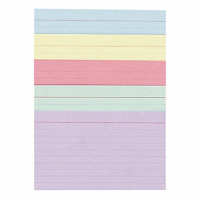




 PR mogul Richard Edelman
PR mogul Richard Edelman


 Do you know the difference between abstruse and obtuse? Affect and effect? Is "alright" all right? When should you use "each" instead of "both?"
Do you know the difference between abstruse and obtuse? Affect and effect? Is "alright" all right? When should you use "each" instead of "both?"





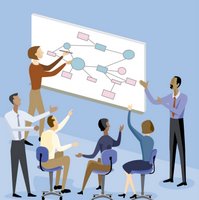






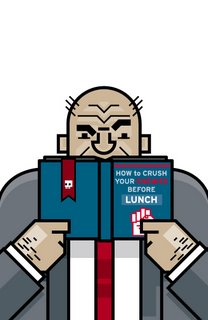

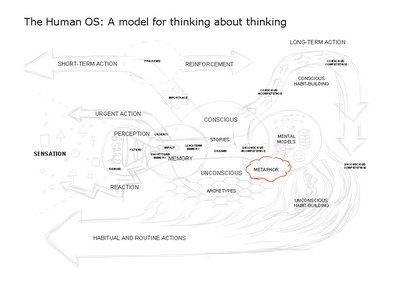

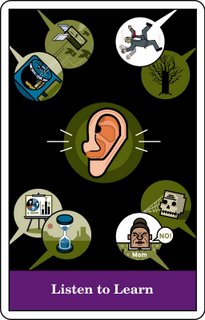



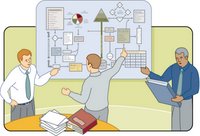







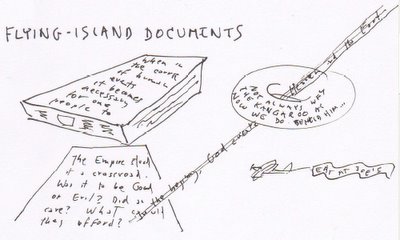 Theodor Holm Nelson
Theodor Holm Nelson
